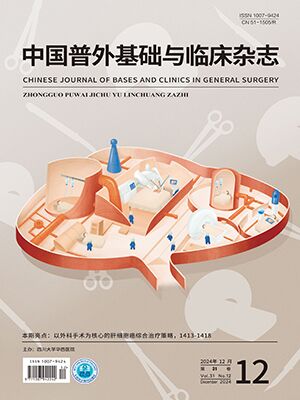Objective To investigate the effect of cholecystectomy on the induction of large intestine cancer and its mechanism.
Methods After cholecystectomy, the large intestine neoplasm in mice was induced with dimethylhydrazine(DMH).The histogenesis and growth pattern of large intestine cancer were observed.The Sphase fraction (SPF) of epithelium cells in large intestine mucosa was determined using flow cytometry. Before and after operation, the feces of mice were collected to determine the cholic acid (CA), chenodeoxycholic acid (CDCA), deoxycholic acid (DCA) and lithocholic acid (LCA) concentration by highperformance liquid chromatography.
Results The average number of large intestine neoplasms per mouse,percentage of large intestine adenomas in examined mice and SPF of experimental group were significantly higher than those of control group (P<0.05). The fecal LCA concentration in postcholecystectomy was significantly higher than that in precholecystectomy and in sham operation group (P=0.00).
Conclusion The large intestine neoplasm of mice induced by DMH is increased and the proliferation of epithelium cell in large intestine mucosa is increased after cholecystectomy. This suggests that cholecystectomy has promoting effect on induction of large intestine neoplasm in mice. The gut may deal with the increased secondary bile acid(LCA) concentration postcholecystectomy.
Citation: ANG Bo,JIANG Yanyong,XIAO Yinqi,et al. Effect of Cholecystectomy on the Induction of Large Intestine Cancer by Dimethylhydrazine in Mice. CHINESE JOURNAL OF BASES AND CLINICS IN GENERAL SURGERY, 2002, 9(1): 19-22. doi: Copy
Copyright © the editorial department of CHINESE JOURNAL OF BASES AND CLINICS IN GENERAL SURGERY of West China Medical Publisher. All rights reserved




